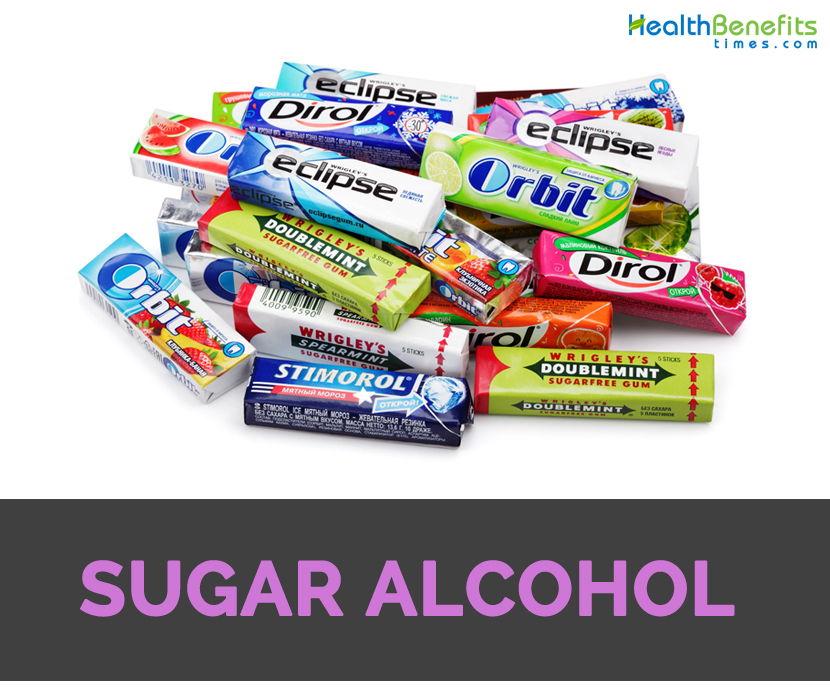 Sugar alcohols are monosaccharide and disaccharide derivatives, such as sorbitol and xylitol, which are extensively used as sweeteners in the food industry. They have got increased attention because of their desirable properties of relative sweetness and limited digestion and absorption. Sugar alcohols are also classified as carbohydrates although their empirical formula is slightly different. Since these substances can be found in plants, sugar alcohols such as sorbitol, xylitol, lactitol, mannitol, and maltitol are recognized as artificial sweeteners. Sugar alcohols are used mainly to sweeten sugar-free candies, cookies, and chewing gums as they do not promote the formation of cavities in the same way as sugars.
Sugar alcohols are monosaccharide and disaccharide derivatives, such as sorbitol and xylitol, which are extensively used as sweeteners in the food industry. They have got increased attention because of their desirable properties of relative sweetness and limited digestion and absorption. Sugar alcohols are also classified as carbohydrates although their empirical formula is slightly different. Since these substances can be found in plants, sugar alcohols such as sorbitol, xylitol, lactitol, mannitol, and maltitol are recognized as artificial sweeteners. Sugar alcohols are used mainly to sweeten sugar-free candies, cookies, and chewing gums as they do not promote the formation of cavities in the same way as sugars.
Sugar alcohols are organic compounds which are derived from sugars comprising class of polypols. It is a white and water soluble solids occurring naturally or could be produced industrially from sugars. In commercial foodstuffs, sugar alcohols are used commonly instead of table sugar and often in combination with high intensity artificial sweeteners to counter low sweetness. Besides adding sweet taste, sugar alcohols perform various functions such as providing cooling effect or taste, adding bulk and texture and inhibiting browning which occurs during heating and also retain moisture in foods.
Food Sources
- Baked goods
- Chewable vitamins
- Candies
- Cough drops
- Chocolates
- Drinks
- Cough syrups
- Gums
- Frostings
- Jellies
- Ice cream
- Puddings
- Mouthwashes
- Toothpastes
Health Benefits of Sugar Alcohol
1. Supports metabolism
Sugar alcohols are slowly as well as incompletely absorbed from small intestine into blood. When absorbed, it is converted to energy by process that requires no to little insulin. Some sugar alcohol is not absorbed into blood but passes through small intestine and is fermented by bacteria in large intestine. Its excess consumption provides laxative effect. This means that by consuming foods that contain sugar alcohol, you will eventually have a regular bowel movement.
Moreover, because sugar alcohol supports metabolism, consuming more of its food sources can aid in weight loss. If you have been trying to lose weight for months and haven’t seen any visible results yet, assess your diet and determine if it contains any food that has sugar alcohol. If it doesn’t, it might be high time for you to change your diet and consume more foods that contain sugar alcohol.
2. Diet for diabetic patients
The basic goal for diabetes management is to maintain near to normal blood glucose levels. Diabetic people should consult physician, health professional and dietitian about incorporating sugar alcohols to daily meal plans. It is recommended that diabetic people should manage blood sugars.
However, if you’re diabetic and would want to add foods rich in sugar alcohol to your diet, it’s important to control your proportion. Sugar alcohol is beneficial for your health in a lot of ways, but eating too much can worsen symptoms of diabetes and, in worse cases, trigger other health problems. Thus, make sure to only consume sugar alcohol in small amounts to keep your sugar levels in check.
3. Low calorie and carbohydrate diet
Due to its low energy density, replacing other carbohydrates with sugar alcohols could lower energy density of food products and plays a crucial role in managing weight. Sugar alcohols have a role in lowering overall glycemic challenge of diet. Excessive intake of energy in any form results to weight gain. Consumer should consider total calorie content of diet and avoid over consumption of foods including those which contains sugar alcohols.
4. Dental health
Bacteria in mouth do not act upon sugar alcohols and therefore does not cause tooth decay. Xylitol inhibits oral bacteria and is used in sugarless mints as well as chewing gums for this reason.
Contrary to popular belief, sugar alcohol can prevent tooth decay through the process called remineralization. In its simplest sense, remineralization is the natural process of repairing the outer layer of your tooth. By consuming more foods with sugar alcohol, your mouth goes through remineralization and becomes the reason why your dental health will significantly improve.
Don’t Go Overboard
Your body needs sugar alcohol to function properly. The health benefits that this sweetener provides allows you to remain productive throughout the day. However, keep in mind that excessive consumption of sugar alcohol can also lead to health risks, such as bloating, cramps, and diarrhea.
For you to enjoy the health benefits of sugar alcohol, and ensure that you won’t experience any health risks, learn more about calculated carbs. If you want to maintain or improve your health, you should know how to calculate carbs from sugar alcohol, so you’ll be able to determine whether you’re consuming excessive amounts regularly.
References:
https://www.joslin.org/info/what_are_sugar_alcohols.html
https://en.wikipedia.org/wiki/Sugar_alcohol
https://www.medicalnewstoday.com/articles/320901.php
https://foodinsight.org/sugar-alcohols-fact-sheet/
http://www2.ca.uky.edu/HES/FCS/Factshts/NEP-JRW-11.pdf
